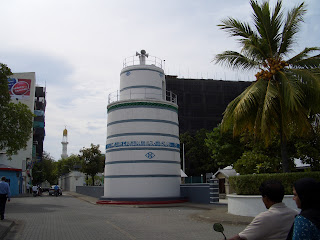Church and State
Religion is very much a part of politics in Maldives. The conservative Islamic party, Adhaalath, is not fielding a candidate in the elections but standing back to decide if they will support President Gayoom or someone else. That support could be decisive if the election is close.
This is not so strange when you consider the role of the Christian religious right in supporting Republicans in the US, or the role of churches and voter turnout in the black community on the Democratic side.
However, they take it a step further here. It was a big story last week that the government funded a new Dhivehi translation of the Koran and is giving a copy to every household. Can you imagine the uproar if the US government started translating and handing out Bibles to EVERYONE? Here is the sign that is on the oldest Mosque which dates back to 1656. In his address to the opening of Parliament, President Gayoom spoke of strengthening Maldives as a “moderate” Islamic state.
Being Muslim is a requirement for citizenship. Some Maldivians go overseas to study or work and may marry non-Muslims, and their children cannot be citizens if they are raised in some other faith. This has caused some concern among human rights observers, including a group from the US that visited a couple of weeks ago. A lawmaker voting to change this law would be committing political suicide.
To read the US House Foreign Affairs Committe report on human rights in maldives:
http://foreignaffairs.house.gov/archives/109/23016.pdf and scroll down to page 2112. To read more about why the religious issues, go to page 704 of this report:http://foreignaffairs.house.gov/archives/109/23762.pdf
It states that Maldivians see their one-religion society as a “disctinctive charactisic” that promotes “harmony and national identity.” However, the US government has an ongoing concern in this area, for obvious reasons.
Pictures show some of the Muslim heritage that you see in Male, dating back to the 12th century when the country’s ruler converted from Buddhism. The old minaret, in the foreground, is no longer used for the call to prayer and has been replaced by that of the Grand Friday mosque, in the background.
Tweet





 Hi, I'm Terry Anzur. I've been a professional multimedia journalist for more than 30 years, anchoring and reporting everywhere from New York to Los Angeles to West Palm Beach. I've taught on-air skills to journalists of all levels, both through positions at the University of Southern California and Pepperdine University and through my own independent company.
Hi, I'm Terry Anzur. I've been a professional multimedia journalist for more than 30 years, anchoring and reporting everywhere from New York to Los Angeles to West Palm Beach. I've taught on-air skills to journalists of all levels, both through positions at the University of Southern California and Pepperdine University and through my own independent company.